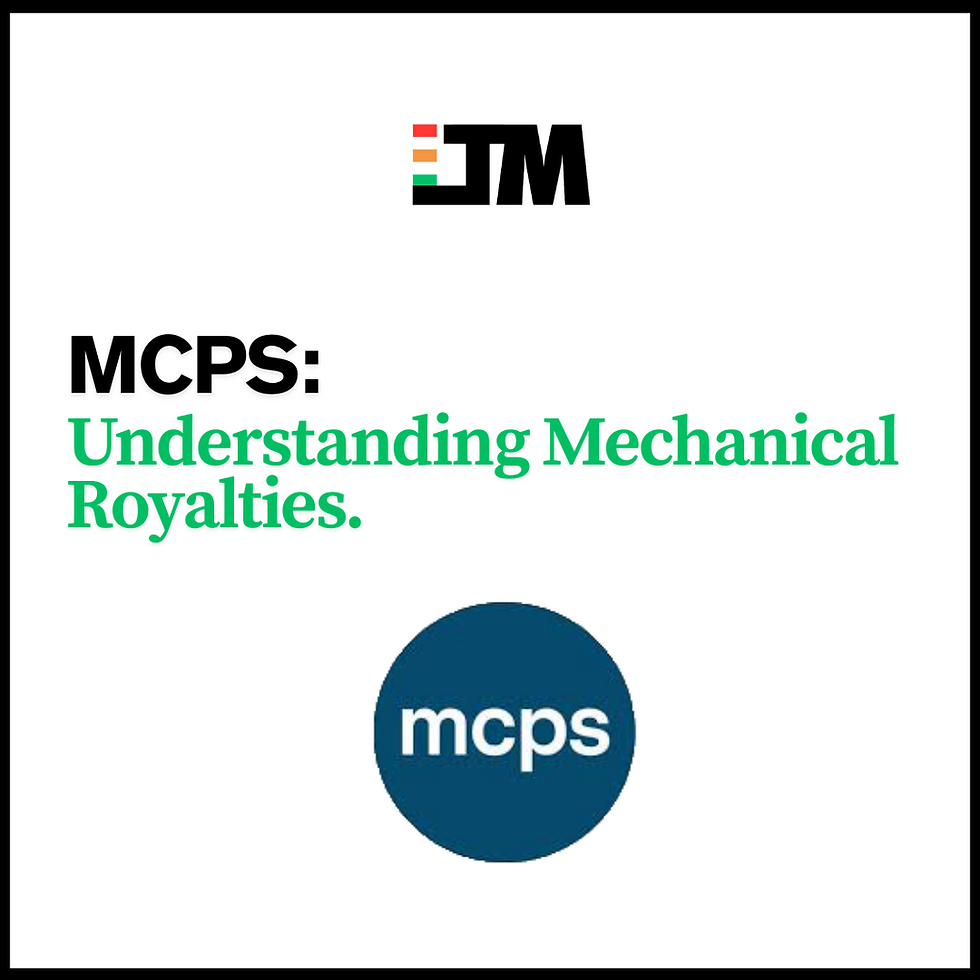PPL: How UK Performers Get Paid
- edbrown2879
- May 8, 2025
- 3 min read
If you’ve ever recorded music—whether as a solo artist, band member, or session musician—you’re likely owed royalties every time your music is played in public.
PPL (Phonographic Performance Limited) is the UK organization that collects these payments for performers and record labels.
But how does PPL work? Who qualifies? And how much can you really earn?
This in-depth guide covers everything you need to know—from registration to maximising your payouts.
What is PPL?
PPL collects recording royalties whenever the master recordings are:
✔ Played on radio or TV (BBC, Capital, Sky, Etc..)
✔ Streamed on interactive and non-interactive platforms (Spotify, Amazon Music, BBC Sounds, radio-style apps)
✔ Played in public (clubs, shops, gyms, festivals)
Who Gets Paid by PPL?
✅ Featured performers (lead singers, band members)
✅ Session musicians (via "non-featured" payments)
✅ Record labels (if they own the recording rights)
❌ Songwriters (that’s PRS’s job)
Example: If your band’s song plays on Radio 1:
PPL pays YOU (the performer) + your label if you're signed.
PRS pays the songwriter (if it’s not you).
How PPL Royalties Work
PPL tracks music usage through:
Broadcast logs (BBC, commercial radio)
Public performance reports (clubs, venues, businesses)
International partnerships (for plays outside the UK)
Royalties are distributed Four times a year (depending on earnings and where they come from for example: International are every quarter but UK specific royalties are not.)
1. How Do I Register with PPL?
Step 1: Go to PPL UK
Step 2: Sign up as a performer (free) or rights holder (if you own recordings)
Step 3: Submit your recordings (manually or via your distributor)
Pro Tip:
Bands: Each member should register individually.
3. What’s the Difference Between PPL and PRS?
PPL | PRS |
Pays performers & labels | Pays songwriters & publishers |
Covers recordings | Covers compositions |
Radio, TV, public venues, streaming | Live gigs, streaming, radio |
Example:
If Dua Lipa’s "Levitating" plays in a club:
PPL pays Dua (performer) + Warner Music (label)
PRS pays the songwriters (Dua + co-writers on the song)
Q. Can Session Musicians Claim PPL Royalties?
A. Yes! If you played on a recording that gets radio/TV/club play/streams, you’re owed money! You can claim royalties on the song as long as it is still earning money. This can go on throughout the entirety of your musical career and even life.
How to Claim:
Register as a non-featured performer here.
Submit your session credits (use PPL’s Repertoire Database).
Common PPL Myths Debunked
❌ "I’m Not Signed, So I Won’t Earn Anything"
Even unsigned artists earn from:
Local radio plays
Club DJ sets
YouTube Content ID (if registered)
❌ "PPL Only Pays Big Artists"
Nope—any performer on a recording can claim, even for small indie releases.
❌ "I Need a Label to Register"
False! You can self-register as a performer or rights holder.
How to Maximise Your PPL Earnings
1. Claim ALL Your Recordings
Old bands? Claim past releases.
Session work? Log every credit.
2. Register for PPL International
Collect royalties when your music is played in the US, EU, etc.
3. Use PPL’s Repertoire Database
Check for missing tracks and fix errors.
4. Opt Into "Match & Claim"
PPL’s system automatically matches your music to broadcasts.
Final Thoughts
If you’ve ever recorded music, you’re leaving money on the table without PPL. Registration is free for performers, and royalties last a lifetime.
Ready to join? Sign up for PPL here.
Got More Questions?
Drop them in the comments or watch my YouTube Video Series where I break down PPL and how you can start to earn money through them!




Comments